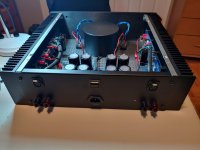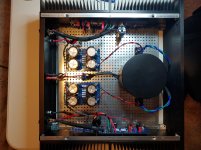Yes, typo - thanks for the heads-up
I meant the LED orientation may be reversed beside R28 resistor
I meant the LED orientation may be reversed beside R28 resistor
C6 and C7 Capacitor rating question, and also resistors
Alas, I didn't see this excellent forum before diving into the Aleph J build. I used posted Rev. D BOM for purchasing my components. There is a difference in the C6 and C7 capacitors, 0.1uF and 0.33uF, in the original Rev. D BOM and the one attached to this thread, respectively. Thoughts on this? The original schematic didn't have a value for these.
Second block of questions relates to the use of 1/4W vs 1/@W resistors for R9-13, R14, and R24 in the original BOM and the one for this thread. Thoughts?
Additionally, the R2 and R4 resistors have increased in spec from 1/4W to 1W (wow).
Thanks and keep up the good work.
Alas, I didn't see this excellent forum before diving into the Aleph J build. I used posted Rev. D BOM for purchasing my components. There is a difference in the C6 and C7 capacitors, 0.1uF and 0.33uF, in the original Rev. D BOM and the one attached to this thread, respectively. Thoughts on this? The original schematic didn't have a value for these.
Second block of questions relates to the use of 1/4W vs 1/@W resistors for R9-13, R14, and R24 in the original BOM and the one for this thread. Thoughts?
Additionally, the R2 and R4 resistors have increased in spec from 1/4W to 1W (wow).
Thanks and keep up the good work.
1/4 W is plenty for the resistors you mentioned.
For the caps C6 and C7, use at least the voltage you're using for the 220uF. The exact
capacitance is not important. (As you've noted, they aren't in the original schematics.)
For the caps C6 and C7, use at least the voltage you're using for the 220uF. The exact
capacitance is not important. (As you've noted, they aren't in the original schematics.)
Excellent advice as always, DH! 
1/4W are fine, also 400mW resistors are becoming more common in the same body size, so don’t limit yourself to 1/4 in the search string.
C6 C7 can be ignored if you like. They will be omitted from the PCB if there is ever a revision... so obviously they are not too critical!

1/4W are fine, also 400mW resistors are becoming more common in the same body size, so don’t limit yourself to 1/4 in the search string.
C6 C7 can be ignored if you like. They will be omitted from the PCB if there is ever a revision... so obviously they are not too critical!
Dennis, thanks for the input. Going from 1/4 or 1/2W to 1W seemed like a big jump to me, and I didn't know if I had missed something that had developed.
Cheers!
Cheers!
Hello folks
I finished the Aleph J amp last week, tested great. I just wanted to thank the community for all the guidance and advice this was a very fun project over this winter!! For this build, my philosophy was to use point-to-point wiring to most joints as I do believe materials such as tin with various conductivity characteristic can negatively affect the sound - maybe it's just me but I don't like them..I used quality copper to copper connection everywhere with Cardas solder and built my own back panel connectors with Fututech and full copper binding posts.
Sound is very engaging and detailed with clear instrument separation.
Question: how much time does the Aleph J take to properly break-in or loosen up? I find the imaging could be much better, compared to other amps I've own with same system find that I can easily locate where is the left and right speaker are located. With my former Bryston 2.5B3 amp, the speakers would just disapear in a "bubble" in front of me.
I am guessing it needs considerable break-in time, just wondering if anyone had same experience.
I finished the Aleph J amp last week, tested great. I just wanted to thank the community for all the guidance and advice this was a very fun project over this winter!! For this build, my philosophy was to use point-to-point wiring to most joints as I do believe materials such as tin with various conductivity characteristic can negatively affect the sound - maybe it's just me but I don't like them..I used quality copper to copper connection everywhere with Cardas solder and built my own back panel connectors with Fututech and full copper binding posts.
Sound is very engaging and detailed with clear instrument separation.
Question: how much time does the Aleph J take to properly break-in or loosen up? I find the imaging could be much better, compared to other amps I've own with same system find that I can easily locate where is the left and right speaker are located. With my former Bryston 2.5B3 amp, the speakers would just disapear in a "bubble" in front of me.
I am guessing it needs considerable break-in time, just wondering if anyone had same experience.
Attachments
Last edited:
Try reversing your speaker leads.
As out of phase messing up the image?
As out of phase messing up the image?
You just have to reverse -/+ on the speaker side and reverse the -/+ on your xlr connector. The result is that you keep the absolute phase of the system the same but you are reversing the phase of the harmonic distortion content. So instead of having negative phase second harmonics coming out of the amp you now have positive phase second harmonics. (Or maybe it’s the opposite with the Aleph, not sure).
Doing this change the presentation/proximity/depth of field front to back a little. Maybe this is what you are looking for. I think I have read somewhere that a lot of people prefer the sound of the aleph wired that way!
Hubert
You just have to reverse -/+ on the speaker side and reverse the -/+ on your xlr connector.
Hubert
Do I need to do both at the same time? I just don't want to destroy my speakers
Just attach the speakers wires ‘backwards’. Red to black and black to red at the amplifier. It won’t hurt anything.
Do I need to do both at the same time? I just don't want to destroy my speakers
Yes so that you keep absolute phase of the amp the same. Just reverse your speaker cables on the amp binding post : neg on pos and pos on neg. And inverse polarity at the input reversing pin 2 and 3 on the xlr. And why not trying it like 6L6 suggested without inverting the input!
Yes so that you keep absolute phase of the amp the same. Just reverse your speaker cables on the amp binding post : neg on pos and pos on neg. And inverse polarity at the input reversing pin 2 and 3 on the xlr. And why not trying it like 6L6 suggested without inverting the input!
I also have 180 degree phase out button on my pre-amp. That should be the same as inverting the XLR input alone
I also have 180 degree phase out button on my pre-amp. That should be the same as inverting the XLR input alone
Yes absolutely, that make it quite easy to try both configuration!
Sebtdi - Do you have your PSU halves connected together in the center? I can't tell from the photo but it looks like they are not...
Also where does PSU ground connect to (through CL60 or similar) chassis?
Also where does PSU ground connect to (through CL60 or similar) chassis?
Sebtdi - Do you have your PSU halves connected together in the center? I can't tell from the photo but it looks like they are not...
Also where does PSU ground connect to (through CL60 or similar) chassis?
Yes, ground wires run under the peg board - just a cleaner look IMHO. Both PS boards are connected together to CL60 star ground as per instructions. Don't get me wrong the amp sounds great, just puzzled as to why reversing the speaker output improves the image..
Don't get me wrong the amp sounds great, just puzzled as to why reversing the speaker output improves the image..
The explanation is that our brain perceive things differently depending on the phase of the harmonic distortion. Excerpt from Nelson Pass in the H2 Harmonic Generator article :
“So why is the phase important? Well, it's a subtle thing. I don't suppose everyone can hear it, and fewer particularly care, but from listening tests we learn that there is a tendency to interpret negative phase 2nd as giving a deeper soundstage and improved localization than otherwise. Positive phase seems to put the instruments and vocals closer and a little more in-your-face with enhanced detail.”
- Home
- Amplifiers
- Pass Labs
- Aleph J build guide for noobs

